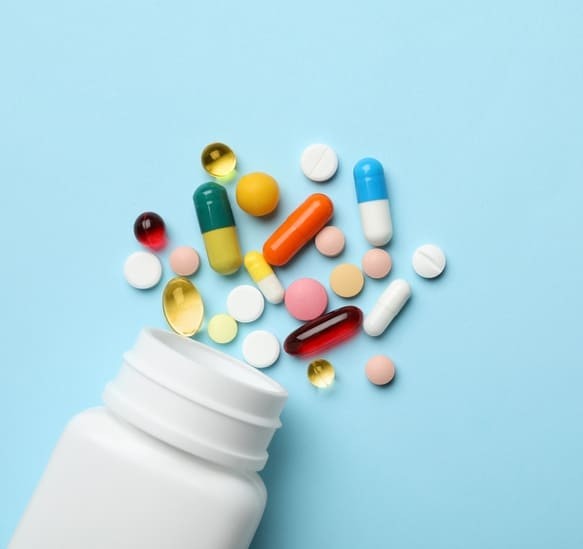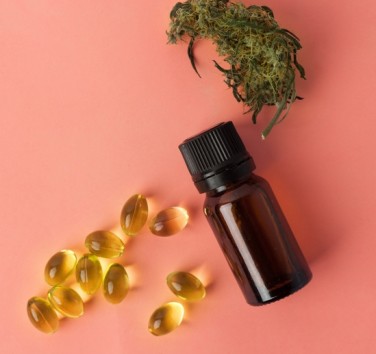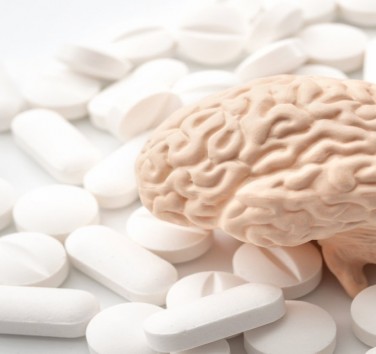Sommaire
- Cannabidiol (CBD), a trusted product
- How does CBD interact with medications?
- Potential side effects of CBD
- What is happening in the body when ingesting CBD?
- CBD vs THC
- Indications for consuming CBD at the same time as medication
- CBD: A contraindication for pregnant women?
- What effects on people with mental disorders?
- Necessary precautions for arterial problems and CBD
- The potential risks of CBD for people with heart problems
- Contraindication of CBD for respiratory problems
- CBD may be contraindicated in cases of 'allergy
But then, is it possible to combine CBD with medication for a particular pathology? Scientific studies agree that it is entirely possible to take medication while consuming CBD, although there are some precautions to take that we will describe to you in the content of this page. Generally, CBD is a very safe product, with very few to no side effects.
In this article, we will guide you on things to know before taking CBD, as well as the interactions between medications and CBD in metabolism. In addition, below you will also find numerous scientific studies on the subject and tips to make your experience with CBD as beneficial as possible.
Cannabidiol (CBD), a trusted product
Indeed, numerous scientific studies agree that cannabidiol (CBD) has no danger for the human body. The molecule in question does not make you “stoned” and has no effects on the different pathologies that an individual may have. Furthermore, CBD is not addictive as other hemp components could be. This scientific study confirms it. CBD is a natural plant extract from a plant widely used for its therapeutic benefits. It can be considered as a natural remedy.
What does the World Health Organization (WHO) say about cannabidiol? It certifies that CBD is not harmful to health and is not in the classification of controlled substances (as dangerous drugs could be). Additionally, according to the WHO, CBD does not exhibit any effects indicating potential for abuse or dependence.
The only way CBD is dangerous is through overdose. According to American laboratories, CBD overdose is defined as consumption of more than 20,000 mg per day, an amount that is very difficult to achieve for an average consumer.
.jpeg)
How does CBD interact with medications?
Generally speaking, CBD does not interact dangerously with medications. Unlike alcohol, there is no rule saying that CBD and medicine do not go well together.
On the contrary, many patients with significant pathologies find themselves consuming CBD in addition to their medication because CBD provides a more natural, less restrictive and, above all, effective fairly quickly side. , particularly in terms of pain and anxiety.
That said, each case is unique and the advice of a healthcare professional is essential when taking daily medications.
Potential side effects of CBD
Although CBD is generally well tolerated and considered safe, it can cause certain side effects in some individuals. These effects appear particularly in the event of excessive or prolonged consumption.
- Dry mouth: CBD may affect salivary receptors, leading to a feeling of dry mouth.
- Drowsiness: Especially at higher doses, CBD can cause drowsiness. It is therefore advisable not to drive or use heavy machinery after consumption.
- Changes in appetite: CBD can either increase or decrease appetite, depending on the individual.
- Diarrhea: Particularly when taking large quantities, CBD can disrupt the digestive system.
- Drug Interactions: As mentioned earlier in the article, CBD can interact with certain medications, changing their effectiveness or causing side effects.
It is essential to consult a healthcare professional before starting any CBD treatment, especially if you are already taking medication.
What is happening in the body when ingesting CBD?
Once ingested, CBD, like medications, is metabolized by the liver before it can be distributed throughout the body. The liver, for its part, will use special enzymes to break down the CBD into smaller components (metabolites) and distribute them throughout the body through the bloodstream. This process couldn't be more natural.
When ingesting CBD and medication at the same time, a phenomenon is created: the liver focuses all its attention on the components of CBD and neglects other medications which also, should be broken down into small components and then distributed throughout the body. It is in particular the cytochrome P450 enzyme which is at the origin of this phenomenon.
But then is this phenomenon dangerous? It can be restrictive in the sense that certain medicinal products must be broken down and distributed quickly after ingestion because if they stagnate too much, they can create side effects (nausea, headache, etc.) that are very annoying for the patient.
In short, taking drugs metabolized by the cytochronous P450 enzyme in the liver at the same time as CBD will be affected by this phenomenon. Some steroids, antibiotics, antidepressants, beta blockers and antihistamines fall into this category. According to a 2020 American study, a list of 57 drugs that can be disrupted by CBD have been established.
Among these 57 medications whose action could be disrupted by CBD, we find antidepressants (amitriptyline, clomipramine and lofepramine), oral contraceptives (ethinylestradiol), analgesics ( fentanyl), thyroid medications (levothyroxine), sedatives (propofol), and anticoagulants (acenocoumarol and warfarin).
Note that the dosage of CBD as well as the drug in question, the age, weight, health condition of the consumer in addition to other factors are crucial information that can vary this interaction into positive or negative.
Interesting fact: A component of grapefruit also interacts like CBD with medications in the liver.
Are all forms of CBD equal?
No, not all forms are equally faced with this metabolization phenomenon. As you probably already know, different types of consumption allow different types of effects. Inhaled CBD acts the fastest through the bloodstream, with the most CBD consumed.
On the other hand, CBD used as an ointment or edible will have very little effect because there is less CBD in it and will take longer to act.
For CBD to interact as explained above with medications, its dosage must reach a high peak, which is not the case in all consumptions.
CBD vs THC
Cannabis is composed of several chemical components, the two best known of which are cannabidiol (CBD) and tetrahydrocannabinol (THC). Understanding the distinction between these two molecules is essential to understand their respective effects and contraindications.
Effects on the brain:
- THC is primarily responsible for the psychoactive effects of cannabis, causing euphoria, altered perception or “high” sensations.
- CBD, on the other hand, does not exhibit these psychoactive effects. On the contrary, some research suggests that CBD may mitigate the effects of THC.
Therapeutic use:
- While THC may have therapeutic applications, such as in the treatment of pain or nausea, its consumption is often limited due to its psychoactive effects.
- CBD, with its potential anti-inflammatory, antioxidant and anxiolytic properties, has attracted increased interest in the medical field without the psychoactive implications.
Contraindications of THC:
- Due to its psychoactive effects, THC may interact negatively with certain medical conditions, such as psychiatric disorders.
- It may also cause side effects such as anxiety or paranoia in some individuals.
Indications for consuming CBD at the same time as medication
After understanding how it all worked, the question remains intact. Should you use CBD when taking medication?
As you understood from the article, drugs and CBD do not produce a destructive potion when combined, as drugs with alcohol could . Rather, it is a problem of confusion in the liver which could cause discomfort when ingesting both at the same time.
Moreover, we must keep in mind that the studies take into account types of consumption ranging from 200 to 400 mg per day, which is the regular consumption of very few people in the end. .
To take precautions and prevent this potential discomfort, here are some tips to take into account when consuming CBD and medication at the same time:
-
First, space out medication with CBD by a few hours. This gives the liver time to do its job properly with each ingestion.
-
Second, always tell your doctor. It is he who will tell you what dose of CBD will suit your medication intake.
-
Finally, favor quality products, in particular products approved by the French State, which are very strict on the protocol production and distribution of CBD products in France.
To find quality Premium products, including very popular CBD oils whose components are clearly identifiable, consult the French online store 321 CBD .
CBD: A contraindication for pregnant women?
There are not enough in-depth studies on the effects of CBD during pregnancy, unlike THC, which has been shown to be harmful to the developing brains of newborns.
Although studies in laboratory mice are quite promising, no clinical studies in humans have been performed.
It is therefore recommended not to consume CBD during pregnancy or while breastfeeding to avoid any risk for the child.
What effects on people with mental disorders?
What effects on people suffering from mental disorders?What effects on people suffering from mental disorders? mental?
The effects of CBD on people with schizophrenia or Parkinson's disease can vary greatly depending on the person affected. For people with schizophrenia, some studies have shown that CBD can help reduce psychotic symptoms such as hallucinations and delusions. However, it is important to note that CBD should not be considered a quick fix for schizophrenia and that results may vary from person to person.
When it comes to Parkinson's disease, CBD can potentially help reduce the tremors and muscle rigidity associated with this disease. Preliminary studies have shown encouraging results, but more research is needed to establish the effectiveness and safety of CBD in people with Parkinson's disease.
It is important to note that CBD should never be considered a substitute for proper medical treatment for these conditions.
source: https://www.ncbi.nlm.nih.gov/pmc/articles/PMC8343183/
Necessary precautions for arterial problems and CBD
Although CBD can be beneficial in relieving hypertension, it can also cause unwanted side effects such as as dizziness in people with low blood pressure. It is therefore recommended to take extra precautions by respecting relatively low CBD dosages and seeking the advice of a doctor if you suffer from arterial problems and wish to consume CBD. Indeed, personalized medical advice can help you determine if this substance is suitable for your state of health.
The potential risks of CBD for people with heart problems
Side effects of CBD such as changes in blood pressure and increased heart rate may be concerning for people with cardiovascular conditions. Although these side effects are usually mild in young people, they may be more serious in people over 50 who have heart problems. Therefore, it is recommended to consult your doctor before using CBD if you suffer from any heart conditions. As a result, your doctor will be able to assess the potential benefits and risks to your health.
Contraindication of CBD for respiratory problems
It is important to note that CBD may be contraindicated for people suffering from respiratory problems. However, this caveat primarily applies to consuming CBD in smoke form. Indeed, CBD smoke can have harmful effects similar to those of tobacco on the respiratory tract, which can lead to an increased risk of cystic emphysema. Therefore, it is recommended to avoid consuming CBD in smoke form if you suffer from respiratory problems. It is best to opt for alternative consumption methods, such as CBD oils or capsules, which do not pose the same respiratory health risks.
CBD may be contraindicated in cases of 'allergy
It is important to note that CBD can be contraindicated in cases of allergy to the hemp plant, in particular to the “Cannabis Sativa L.” variant. People who are allergic to the pollen of this plant may experience side reactions to cannabidiol consumption and should therefore be vigilant.










